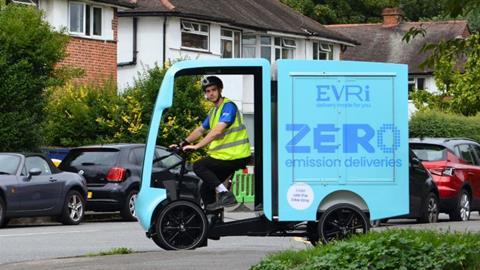Evri is investing £19m in new plans to fast-track the rollout out of its electric cargo bike fleet as part of wider plans to slash the delivery company’s emissions.
The funding will fuel Evri’s mission to put together the UK’s biggest fleet of e-cargo bikes for parcel delivery.
Evri will grow its fleet of e-cargo bikes from 33 to 99 and electric vehicles (EVs) from 168 to 270 within the next year.
The business also has plans to grow its fleet of electric cargo bikes to 3,000 over the next decade - as part of its wider plans to reduce carbon emissions across its network and become a net-zero company by 2035.
Evri has established a dedicated final-mile electrification taskforce which will spearhead innovative solutions, explore partnerships, and implement strategies to transform last-mile deliveries into a zero-emission operation.
Evri already has electric cargo bikes operating in London, Bristol, Oxford and Cambridge and the company currently delivers 1.5 million parcels a year, by bike or EV. The business aims to triple that number to around four million over the next year. These deliveries are part of the more than 720 million parcels that Evri delivers each year – of which more than 99% are on time.
Martijn De Lange, Evri chief executive, said: “Pedal power will rev up our efforts to reimagine parcel deliveries in the UK as we aim to become the biggest operator of e-cargo bikes in the sector. We achieved a 9% decrease in carbon emissions since last year.
”The £19m investment announced today will lay the groundwork for Evri to dial up on its ambition to become the UK’s most sustainable parcel carrier.”
The permanent fleet of electric cargo bikes each have a capacity of about 2,000 litres, alllowing each bike to deliver around 110 parcels in one go.
Evri said a single parcel delivery by e-cargo bike can be expected to produce up to 250g in carbon saving alone, adding that plans to deliver 4 million parcels a year by e-cargo bike could save the carbon equivalent to the amount created by driving over 400,000 miles.
The company also plans to replace diesel vehicles used on its ParcelShop, and SME collection routes.
Evri will add 148 EVs to its fleet, before the Christmas period this year, with a further 122 joining the fleet in spring 2025.This will see electric vans account for over half of its ParcelShop drop-offs and collections.
To support these vehicles Evri will continue expansion of its own EV charging infrastructure investing over £1m across its depot network and hubs.
The company said it will also expand its out of home (OOH) estate “significantly”, which currently has more than 15,000 locations, including Tesco Express stores and Post Office branches.
The wider sustainability team has already delivered a 21% carbon reduction per parcel for the financial year 2023-24 with this down to 370g per parcel delivered, surpassing the 10% reduction per parcel achieved in FY 22-23, and a 9% absolute reduction in spite of volume growth.
Earlier this year, Evri achieved a Silver EcoVadis rating, which places the delivery company among the global top 15% of companies rated for sustainability.
In addition, 100% of electricity consumption across Evri sites is backed by Renewable Energy Guarantees of Origin (REGO) certified renewable energy sources.
This latest announcement builds on Evri’s previous investment in renewable bio-methane compressed natural gas which fuels more than half of its first-mile fleet and reduces carbon emissions by up to 84%. The company also uses other alternative fuels, such as hydrotreated vegetable oil (HVO), as standard at its depot in Brooklands.
Pauline Potter, Evri director of procurement and sustainability, said: “Evri is committed to making a positive impact on the environment and delivering a sustainable future.
”Our multi-year ESG plans represent a significant leap forward, and we are confident that these initiatives will propel us towards our net-zero goal.
”We are not just investing in technology, but also in our people, empowering them to be part of the solution. Together, we can build a more sustainable future for the parcel delivery industry, as well as the communities we serve.”

















